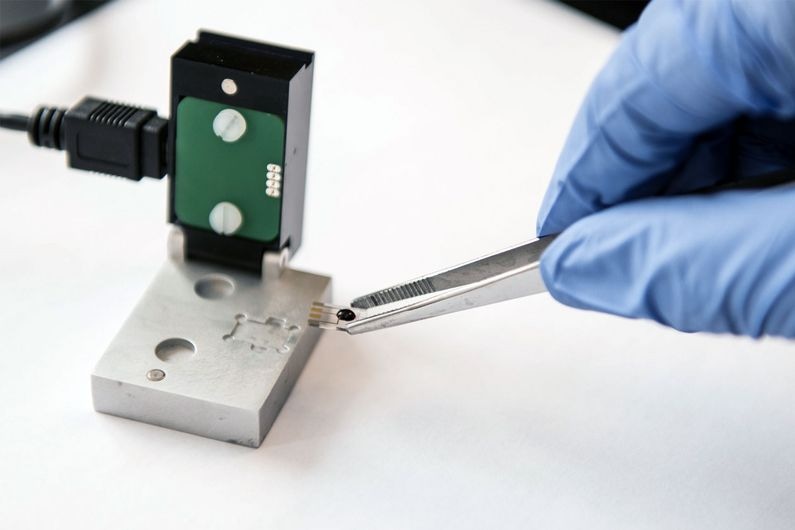May 28 2019
Université de Montréal’s Laboratory of Biosensors and Nanomachines, in collaboration with Montreal company Nanogenecs Diagnostics, has recently been awarded a $700,000 NSERC “Idea to Innovation” grant to build a home blood-testing device for people with chronic diseases.
 Home blood-testing device for people with chronic illnesses (prototype). (Image credit: Amélie Philibert)
Home blood-testing device for people with chronic illnesses (prototype). (Image credit: Amélie Philibert)
The lab is headed by Alexis Vallée-Bélisle, who also holds a Canada Research Chair in Bioengineering and Bio-nanotechnology.
His primary goal is to create a biosensor to detect three biomarkers – potassium, urea, and creatinine – from a drop of blood. People with heart disease and kidney disease usually need to monitor these markers.
Presently, blood testing process comprises of many steps that typically requires patients to have blood drawn in a lab or clinic.
After blood samples are collected in a hospital or clinic, they get sent to a central analysis lab, which is typically located off-site, then the results are forwarded to the doctor and finally shared with the patient. Our technology aims to change that, so that patients and doctors can get immediate results as part of everyday monitoring. This will allow them to take fast action if something is out of range.
Alexis Vallée-Bélisle, Head of Laboratory of Biosensors and Nanomachines, Université de Montréal
Univalor, UdeM's business-development partner, applied for a patent last year to safeguard the technology created by Vallée-Bélisle and his team.
“Our prototype can already detect blood urea levels – now we’re working on electrodes to measure potassium and creatinine,” said Vallée-Bélisle. “Eventually, the device will enable people with chronic illnesses to monitor their condition daily and send results electronically to their doctors. Healthcare professionals will be able to quickly and efficiently respond to changes in their patients’ condition.”
Besides the NSERC grant, the project also received $240,000 sponsorship last year from the Quebec Ministry of the Economy and Innovation.
Eliminating travel time to improve patients’ lives
We believe that, like diabetics with blood glucose meters, patients with other chronic illnesses would benefit greatly from home blood testing, especially during periods when their condition is unstable. This more preventative and personalized form of care could clearly improve their quality of life.
Alexis Vallée-Bélisle, Head of Laboratory of Biosensors and Nanomachines, Université de Montréal
However, the technology still requires many more steps before it is ready to use. Besides these things, the biosensor prototype must endure a series of tests to ascertain it can correctly detect all three markers. The blood urea sensing capabilities of the device are currently being tested in a hospital location under the guidance of Dr. Vincent De Guire, a clinical biochemist at Hôpital Maisonneuve-Rosemont.
After this testing is done, the designers and engineers will aim to create an economical, portable device that is user-friendly, quite like the blood glucose meters used by diabetics.
One clear indication this technology has massive potential: multinational Roche Diagnostics recently signed a sponsorship deal with Nanogenecs to guide the strategic direction to market the technology.
By the time it is set for market, Vallée-Bélisle expects that Nanogenecs – a company he started with four partners and that is also supported by investors in Toronto, Boston, and Philadelphia – will have located investors in Quebec keen to fund the invention’s marketing phase.